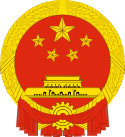- Constitution of the Communist Party of China
-
People's Republic of China 
This article is part of the series:
Politics and government of
the People's Republic of ChinaIdeology- Leadership of China
- Constitutional history
- National People's Congress
- NPC Standing Committee
- President: Hu Jintao
- State Council (Central People's Government)
- Premier: Wen Jiabao
- Vice Premiers
- 1st ranking: Li Keqiang
- State Councilors
- Vice Premiers
- Premier: Wen Jiabao
- PRC Central Military Commission
- Supreme People's Court
- President: Wang Shengjun
- Supreme People's Procuratorate
- Procurator-General: Cao Jianming
- Political Consultative Conference
- National Committee
- Minor political parties
Other issues
The Constitution of the Communist Party of China (CPC) (simplified Chinese: 中国共产党章程; traditional Chinese: 中國共産黨章程) has 53 Articles and includes contents of General Program, Membership, Organization System, Central Organizations, Local Organizations, Primary Organizations, Party Cadres, Party Discipline, Party Organs for Discipline Inspection, Leading Party Members' Groups, Relationship Between the Party and the Communist Youth League, Party Emblem and Flag.
The Party Constitution currently in force was adopted at the Twelfth National Congress of the CPC in September 1982. In accordance with the changing situation and tasks, revisions were made in some of the articles at the Thirteenth National Congress in November 1987 and in the General Program and some of the articles at the Fourteenth National Congress in October 1992, and a few revisions were made in the General Program at the Sixteenth National Congress of the CPC in November 2002.
The organizational principle that drives the political system of the PRC is "democratic centralism". Within the system, the democratic feature demands participation and expression of opinion on key policy issues from members at all levels of party organization. It depends on a constant process of consultation and investigation. At the same time, the centralist feature requires that subordinate organizational levels follow the dictates of superior levels. Once the debate has reached the highest level and decisions concerning policy have been made, all party members are obliged to support the Central Committee.
In the party constitution, and in other major policy statements, the CPC diminished the role of centralism by abolishing the post of party chairman, by prohibiting any future cult of personality, and by emphasizing the importance of collective leadership. The constitution emphasizes the party's role in promoting socialist democracy, in developing and strengthening a socialist legal system, and in consolidating public resolve to carry out the modernization program.
References
 This article incorporates public domain material from websites or documents of the Library of Congress Country Studies. - China
This article incorporates public domain material from websites or documents of the Library of Congress Country Studies. - China
External links
- Text of the Constitution of the Communist Party of China as of November 14, 2002
Categories:
Wikimedia Foundation. 2010.
